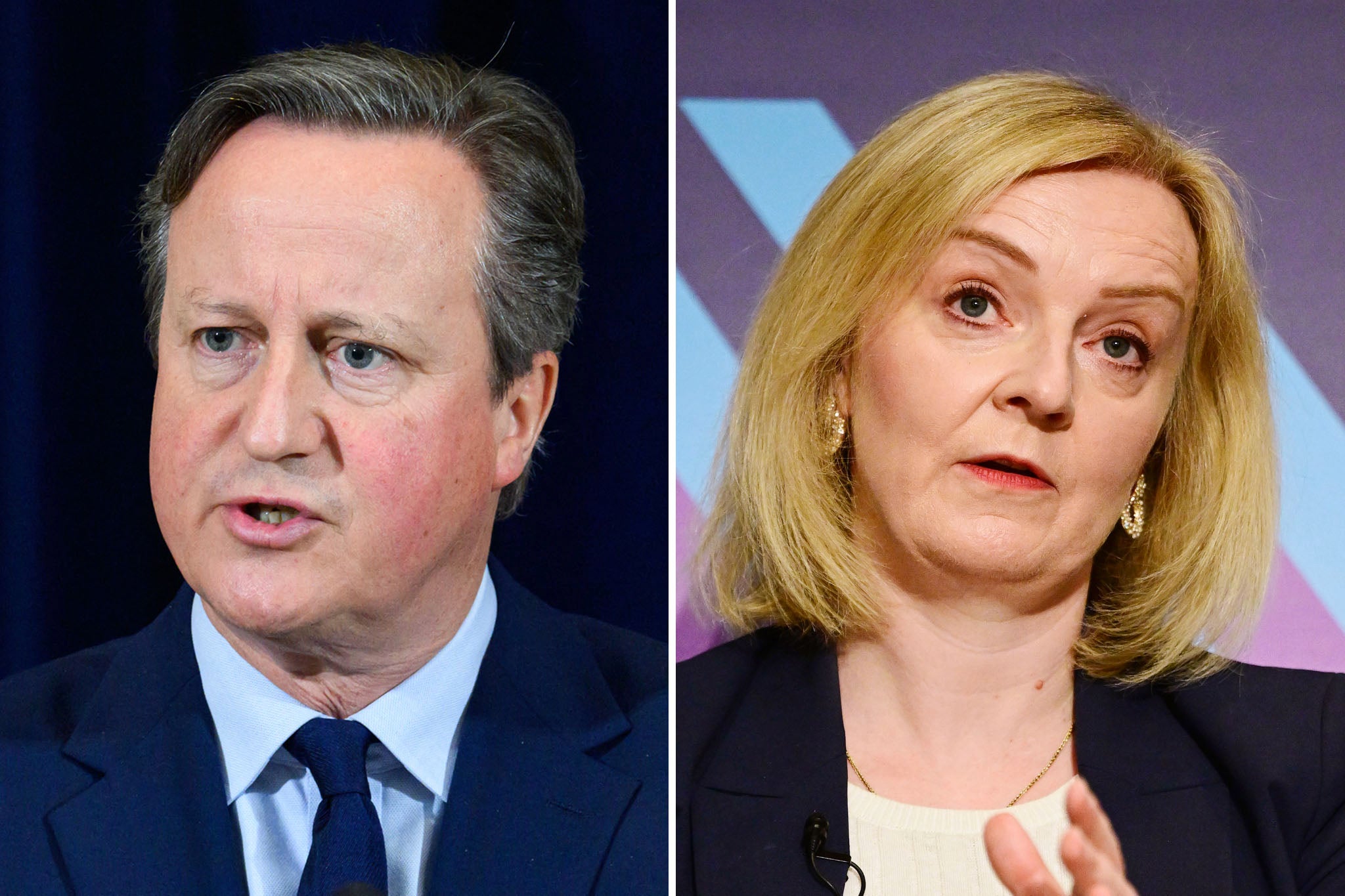Classy Cameron and Trump-courting Truss: a cautionary tale of two comebacks
As PM, David Cameron made mistakes on Libya, Syria and the EU, but he is now showing how to be a former PM, writes Andrew Grice. Liz Truss, not so much…


David Cameron looked a class act on his visit to Washington, batting with skill on a sticky wicket at his joint press conference with Antony Blinken, the US secretary of state.
Cameron is struggling to persuade Republicans to unblock $60bn of military aid for Ukraine and Mike Johnson, speaker of the House of Representatives, declined to meet him.
Cameron wanted to talk about arms to Ukraine but was diverted by media questions on to UK arms to Israel. The Foreign Office’s legal advice is moving towards a view that Israel is breaching international humanitarian law in Gaza, but a divided cabinet – and Rishi Sunak – are not ready to ban arms sales. It is unclear whether the latest advice from officials covers the period in which seven aid workers were killed by an Israeli strike.
Cameron, who advocated a second chance for offenders in his “hug a hoodie” phase as Tory leader in 2006, is taking full advantage of his own second chance – and relishing it. In his first 100 days, he made 36 visits to 26 countries.
I recall how, when I accompanied Cameron to Washington when he was PM, Foreign Office officials didn’t like his plain, undiplomatic speaking. The man dubbed “Candid Cameron” described Gaza as a “prison camp”.
Today, his officials say he has given the UK back its distinctive voice on the world stage. He has been prepared to criticise Israel – to the consternation of many Tory backbenchers, who gave him a hard time when he addressed them before Easter – and suggested the UK might recognise a Palestinian state during negotiations on a long-term solution to the crisis.
As one British diplomat told me: “Until he returned, if you wanted to know what the Sunak government would do, you only had to read what the White House was saying. It’s different now.”
Comfortable in his own skin, a confident Cameron showed dexterity at his Washington presser. Aware he ruffled too many Republican feathers in his previous intervention, he insisted he had “no intention to lecture” anyone but argued it is “profoundly” in America’s interest to support Ukraine with more military supplies – a message he also delivered to Donald Trump during a surprise visit to his Mar-a-Lago resort in Florida.
As PM, Cameron made mistakes on Libya, Syria and the EU, but he is now showing how to be a former PM. He is a good advert for deploying the knowledge and contacts of a former leader to the UK’s benefit. His time is limited by the looming election, so he is not wasting a minute; his assured performance could land him a big international job after the election.
Truss is also in a permanent hurry but, in contrast, is making a mess of her comeback attempt. Her book, Ten Years to Save the West, is out next Tuesday. While Cameron grapples with two real-world crises costing thousands of lives in Ukraine and Gaza, Truss has not escaped her fantasy world, even though it collided with reality when she became PM.
Indeed, she has retreated further into it, claiming in her memoir she was “the only conservative in the room” and her premiership was sunk by a “deep state” promoting “wokeonomics”, which includes the Bank of England, Office for Budget Responsibility, International Monetary Fund, Financial Times and The Economist. I read all their stuff and hadn’t noticed they were part of a left-wing cabal.
Truss told Trump supporters in Maryland: “We have to understand how deep the vested interests of the establishment are, how hard they will fight and how unfairly they will fight in order to get their way.” Yet she was not brought down by this establishment; it was all her own work, and she will win a second chance only if she shows more contrition about her mistakes.
As she lurches further to the right, even some former Truss aides are bemused by her journey. They note the irony of billing her memoir in the US as “leading the revolution against globalism, socialism and the liberal establishment” given her previous support for free markets and free trade.
Truss International, of which her book is part, is aimed very much at the US market. She is taken seriously in Washington, if not in London. Yet, incredibly, it seems Truss has not given up her domestic ambitions. The Westminster grapevine suggests she might back Priti Patel in a post-election Tory leadership contest and become shadow chancellor if Patel won. The Treasury post after her catastrophic mini-Budget? Another fantasy, surely. (Note to readers: this column was not held over from 1 April).
If Cameron can return from the political wilderness, why not the irrepressible Truss? Yet he was PM for six years. She announced her resignation after six weeks. Despite Truss’s comeback hopes, their contrasting fortunes will likely continue.
Truss should have listened to the late Queen Elizabeth II who, she reveals in her book, told her: “Pace yourself.”
Good advice – then and now.
Join our commenting forum
Join thought-provoking conversations, follow other Independent readers and see their replies
Comments
Bookmark popover
Removed from bookmarks